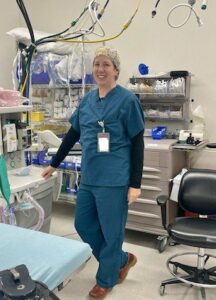
In rural areas, where residents often face barriers to accessing healthcare such as long drives to hospitals, Certified Registered Nurse Anesthetists (CRNAs) help ensure people receive the care they need.
CRNAs are the primary providers of anesthesia care in rural America, often working independently as solo providers, ensuring surgical, obstetrical, trauma stabilization, and pain management services are available. States that are mostly rural, such as New Mexico, rely on CRNAs the most.
“Without CRNAs in New Mexico, the majority of residents wouldn’t have access to care,” said Kimberly Brandt, MSN, MPH, CRNA, a nurse anesthetist in Taos, New Mexico, who is the chief CRNA at the city’s only hospital.

The next biggest hospital is in Santa Fe — an hour and a half away from Taos. In the winter, when ground transport can be difficult due to Taos’ location in the mountains and snowy weather, having a hospital nearby is even more important for area residents and visitors. There are five ski resorts close to Taos, so winter is the hospital’s busy season, particularly for orthopedic trauma, Brandt said.
“It’s a challenge to get patients transferred in the winter, so we need to have a hospital in this community, and it has to be viable. Things come through the emergency room all the time that might require a specialist, but if it’s a life-or-death situation, we make it happen,” Brandt said. “Our patients do well, and that’s a rewarding part of working in a rural community.”
She said she also finds it rewarding to know so many of her patients personally. “I like that I’m close to the community. Often, I’m taking care of people I know, or people who I know of. Some of them specifically request me to do their anesthesia. I like having that kind of connection with the community.”
Brandt spent 15 years as a nurse in New York City and went on to work as a staff nurse at Holy Cross Medical Center in Taos. She then moved to Philadelphia to attend the nurse anesthesia program at the University of Pennsylvania. She’s worked in some of the biggest hospitals in the country and is now at one of the smallest. While working in a rural area can sometimes mean confronting obstacles — from bed shortages and budget concerns to bad weather — Brandt said she likes the challenge of rural medicine.
She works on call, and she doesn’t have the depth of staff the way she would be at a big-city hospital. “When you’re in a bigger hospital, you have an OB team ready to go for your next C-section or epidural. Here, I just put my blinkers on and drive as fast as I can. It does impact your life. You have to be dedicated to want to work in a rural area.”
She added, “People think working in a rural environment means you can sit back and you’ll have easy cases, but that’s not true. I have to think on my feet to provide the best and safest care for patients. If I’m unable to transfer a patient, I think, ‘How am I going to do this with the resources that I have and what do I need to do to keep them as safe as possible?’”
That’s where her training and education as a CRNA kick in. CRNAs are advanced practice registered nurses who must have at least one year of critical care nursing experience prior to attending a nurse anesthesiology program. Brandt worked as a critical care nurse for 19 years before beginning her training in anesthesia.
“As a critical care nurse, you’re making decisions on your own. You don’t have anybody standing over your shoulder telling you what to do. CRNAs have that experience under our belt,” she said.
Because of their nursing background, Brandt added, CRNAs also have a strong rapport with patients — and that human touch makes all the difference when a patient is scared of having surgery.
“Coming from that nursing background, we’re able to allay a lot of the patients’ fears,” she said. “It makes the patient more confident in the care you’re going to give. They trust CRNAs that we’re going to have them go off to sleep and that they’re going to wake up. That’s a big responsibility, but it’s also an honor to provide that care.”